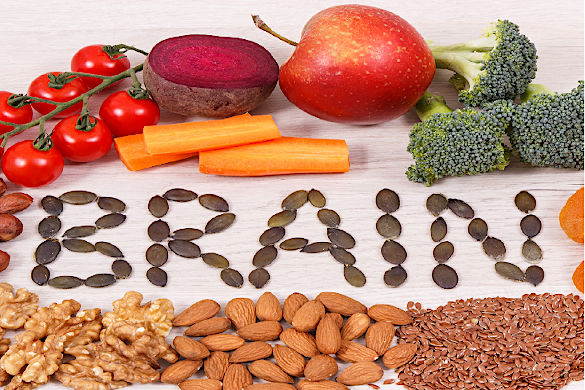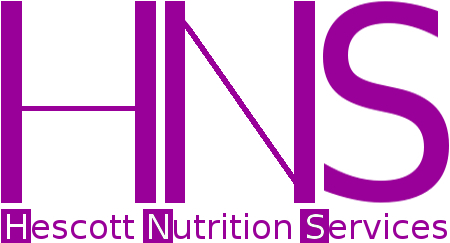.
Welcome to my blog!
.
The Power of Healthy Habits for Brain Health
By Hescott Nutrition Services | posted in May 2023 | Food for Brain Function, Brain Health, Mind Diet, Brain Nutrition, Exercise for Brain Health, Stress Reduction for Brain Health, Sleep for Brain Health, Socialization, Omega-3s Fatty Acid, Coffee and Teas, Spices and Chocolate, Vitamin D, Limit Red Meat, Whole Grains, Red Wine, More Plant.
Have you ever had trouble remembering something really important or know of someone who always forgets information? Does it feel like this forgetfulness is increasing over time? Are you concerned about brain health?

It's not surprising to know that science has been uncovering more about brain health, including how to keep it healthier and prevent cognitive decline. Your brain, often called the "control center" of your body, not only helps with thinking and memory but also regulates bodily functions like breathing, temperature, hunger, and hormones. Preserving your brain's health is critical to prevent chronic diseases like Alzheimer's, and scientific research provides insights on how to achieve this.
There are six essential pillars that influence the health of your brain: exercise, stress reduction, sleep and relaxation, socialization, medications and supplements, and food and nutrition. In this article, we will explore each of these pillars and focus on actionable strategies.
Exercise for brain health

Exercise plays a vital role in brain health as it benefits both physical and mental fitness, reduces stress, improves sleep, and keeps your heart, lungs, and muscles healthy.
Different types of exercise, such as aerobic exercise and strength training, have specific advantages for the brain. Aerobic exercise helps to increase your heart rate and warm up your muscles. Examples of aerobic exercises include biking, swimming, running, and climbing stairs. This type of exercise benefits your brain by preserving existing brain cells and promoting the growth of new brain cells. Another type of exercise is strength or "resistance" training. This is known to help build and maintain strong bones, enhance your concentration, and improve your decision-making skills.
Stress reduction for brain health
Stress reduction is important for maintaining brain health. While stress is a natural response to threats, chronic stress can negatively impact the brain, shrinking the memory and learning centers located in your "prefrontal cortex" while increasing susceptibility to stress located in your "amygdala." Effective stress management techniques, such as prioritizing tasks, focusing on the present moment, and practicing meditation or guided imagery, can help reduce stress and preserve brain health.
Sleep for brain health
Getting sufficient sleep, typically 7-9 hours per night, is essential for mood regulation, stress management, and overall well-being. Establishing a consistent sleep schedule and creating a relaxing bedtime routine like dimming the lights, listening to soothing music, reading a book, or having a warm relaxing bath are effective strategies for ensuring quality sleep. By adhering to a regular sleep routine, your body and brain adapt to a healthy sleep schedule, promoting better brain function.
Socialization
Maintaining connections with people you care about can have numerous benefits for your brain health. It can help reduce stress, improve your mood, and provide a sense of support in your life. Your social network can include family members, friends, and community members. Engaging in spontaneous interactions, such as chatting with a neighbor or going for a walk, as well as participating in organized activities like hobby groups, sports teams, or volunteering, can have positive effects on your brain. Studies suggest that even interacting with pets can promote calmness, improve health, and enhance your social life, all of which contribute to better brain health.
Medications and supplements
Depending on your personal health situation, it may be necessary for you to take medications or supplements. These options can be important in reducing your risks for serious conditions and slowing down the progression of diseases. Medical conditions such as high blood pressure, diabetes, and obesity are linked to deteriorating brain health, which can lead to cognitive decline and the development of dementia. Therefore, managing these conditions through appropriate medications and supplements under professional guidance, and maintaining a nutritious diet can play a significant role in supporting and optimizing brain health.
If your doctor is recommending medications or your registered dietitian-nutritionist is recommending supplements, be sure to take them as directed and go for routine monitoring as required.
Food and nutrition for brain health
There are several foods and nutrients that promote a healthy brain by slowing cognitive decline and reducing your risk of Alzheimer's disease. University researchers developed the MIND diet, which emphasizes the consumption of foods rich in antioxidants, and critical brain nutrients such as vitamins and other plant-based phytochemicals.
Let's explore some of the key foods and nutrients that can boost your brain health.

Omega-3 fatty acids
Omega-3 fatty acids are essential fats that provide benefits for your heart and brain. Fatty fish like salmon, herring, and sardines are among the best sources of omega-3s. The MIND diet recommends at least one serving of fish each week. However, if you're not a fan of fish, you can still obtain omega-3s from plant-based sources such as flaxseeds, chia seeds, walnuts, and soy. These alternatives offer a good supply of omega-3 fatty acids as well.
More plants
Plants provide more than just vitamins and minerals - they are also rich in fiber and phytochemicals. Increasing your intake of plant-based foods not only benefits your brain but also promotes heart health and helps with weight management.
When it comes to brain health, certain deeply-colored fruits and vegetables are very beneficial. Examples include berries, leafy greens, and broccoli. The MIND diet recommends consuming vegetables on a daily basis, having at least six servings of leafy greens each week, and incorporating at least two servings of berries into your weekly dietary intake. By following these recommendations, you can enhance your brain health through the consumption of nutrient-rich plant foods.
Spices and chocolate

Spices such as turmeric, cinnamon, and ginger, as well as, dark and unsweetened chocolate, are rich in antioxidants known as flavonoids. These compounds have been found to enhance blood flow to the brain and reduce inflammation. Turmeric, in particular, contains a powerful antioxidant called curcumin, which has been studied for its potential brain-boosting properties. Incorporating these spices into your cooking and enjoying dark chocolate in moderation can be a tasty way to introduce flavonoids into your diet to support brain health. Just remember to choose dark chocolate with a high percentage of cocoa for maximum benefits.
Coffee and teas
Coffee has been associated with potential memory-enhancing effects and a reduced risk of dementia. Consuming up to three cups of black coffee per day is generally recommended to reap these potential benefits. However, it's important to note that individual sensitivities to caffeine may vary, and excessive consumption should be avoided.
Black and green teas contain antioxidants that can support brain health. These teas contain compounds such as catechins and flavonoids, which have been linked to cognitive benefits. Incorporating black and green teas into your daily routine can be a flavorful way to introduce these antioxidants that may support your brain health.
Moderate consumption of red wine
Resveratrol is a compound present in red wine and the skin of red grapes. It acts as an antioxidant that may reduce cell damage and protect against the formation of brain plaques. However, it is important to note that excessive alcohol intake can have negative effects on the brain. To enjoy the potential benefits of resveratrol without overdoing it, it is recommended to limit red wine intake to one glass per day for women and two glasses per day for men. Alternatively, you can obtain resveratrol from alcohol-free sources like red grape juice.
Whole grains
Whole grains such as oats and quinoa are significant components of the MIND diet due to their high content of brain-healthy B vitamins and fiber. B-vitamins play a critical role in brain function by aiding in energy production, DNA repair, maintaining neuron structure, and facilitating the creation of essential neurochemicals. Additionally, B-vitamins act as antioxidants to reduce the detrimental effects of free radicals that can harm brain cells and other cells in the body. Including whole grains in your diet can provide the necessary B vitamins and fiber to support optimal brain health.
Vitamin D
Vitamin D, often referred to as the "sunshine" vitamin, is produced by the skin when exposed to sunlight. Low levels of vitamin D have been associated with an increased risk of brain disorders like Alzheimer's disease. To boost your vitamin D levels, spending 5-15 minutes in the sun three times a week is recommended. However, individuals with darker skin or residing in northern latitudes may require slightly more sun exposure. It's important to balance sun exposure with sunscreen use to avoid an increased risk of skin cancer. As an alternative, vitamin D supplements are widely available and can be discussed with a Registered Dietitian-Nutritionist to determine the appropriate dosage for you.
Limit red meat
Consuming excessive amounts of foods high in saturated fats has been associated with a higher risk of heart disease and Alzheimer's disease. To promote brain health, the MIND diet advises limiting red meat intake to no more than four servings per week. It is beneficial to reduce the consumption of red meat, butter, and dairy products whenever possible. Instead, consider incorporating plant-based protein sources such as beans, lentils, and soy as substitutes. These alternatives can provide the necessary nutrients while reducing the intake of saturated fats associated with potential health risks.
Conclusion
To enhance brain health, adopting various healthy habits is extremely important. This includes engaging in regular exercise, managing stress levels, prioritizing sufficient sleep, fostering social connections (including with pets), and following recommended medications and supplements. When it comes to nutrition, it is beneficial to ensure an adequate intake of omega-3 fatty acids, incorporate a variety of plant-based foods, consume spices and dark chocolate, enjoy coffee and tea in moderation, obtain sufficient vitamin D, and indulge in a moderate amount of red wine. However, it is important to limit the consumption of red meat.
If you want more detailed guidance on incorporating these six fundamental brain health
strategies into your lifestyle, consult with a Registered Dietitian-Nutritionist, contact us via email:info@hescottwellness.com
or call 347-915-3738 to schedule an appointment. We can
provide personalized recommendations and provide support to optimize your brain health.
